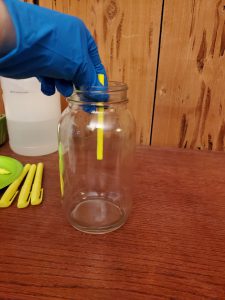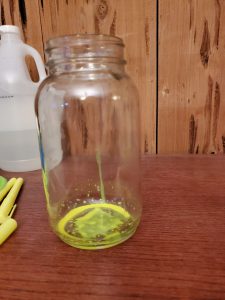Did you buy a bunch of eggs in hopes of dying them for your upcoming Easter celebration? Has the COVID-19 crushed those plans and now left you wondering what you will ever do with all your extra eggs? Luckily there are a lot of neat things that you can do with eggs besides dying them or cooking them. Consider doing an “egg”periment with your kids. An “egg”periment is simply a science experiment that you do with eggs. Below I have listed instructions for one of our most popular “egg”periments, making your own bouncing egg.
Supplies-
Glass Container or Jar
White Vinegar
Raw Unfertilized Egg
Plate
Gloves
Highlighters (Optional)
Instructions-
- Carefully place egg into a glass container or jar large enough for both the egg and liquid that will cover it
2. Pour vinegar over the egg to completely cover it
3. Wait four- five days and observe daily changes in the egg
4. Carefully remove the egg & wash it off
5. Carefully bounce the egg on a plate (WARNING- your egg is still raw and will break!)
6. If so desired, you can lightly puncture the egg to reveal the intact yolk.
*If you want to create an egg that “glows” you can add squeeze out the liquid in a highlighter and add it to step 2. At the end of day four or five you can place it under a black light, where it will glow.



Make it Educational
Ask you kids to hypothesize what will happen to the egg and to make observations about their egg before placing beginning the “egg”periment. Have them check the egg daily and record their observations as the egg begins to change. At the end of the experiment discuss what happened, how did the egg change, was their hypothesis correct, ask them to describe the texture and smell of the egg, and what it reminds them of. Explain to them that eggs are porous, which means that they have tiny holes in their shells. The tiny holes allow the vinegar to seem in where it eats away the egg shell and membrane, turning the albumen, also known as the egg white into a rubbery consistency, and leaving the raw yolk intact.
Want to Learn More?
Check out the 4-H Mall for interesting 4-H curriculum here, https://shop4-h.org/collections/animal-agricultural-science-curriculum#
Also you can follow us on Facebook here, https://www.facebook.com/HighlandsCounty4H/?ref=aymt_homepage_panel&eid=ARDS_TYw7gfh2SrYnoInA9-IuLb-oRHF77qoYfR47slNC7trWPbwYnb0nF6LG5bTDf2PIQuADLjkeLi4 where you can view our live 21 day embryology project.
 1
1
